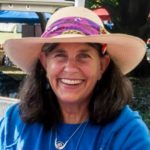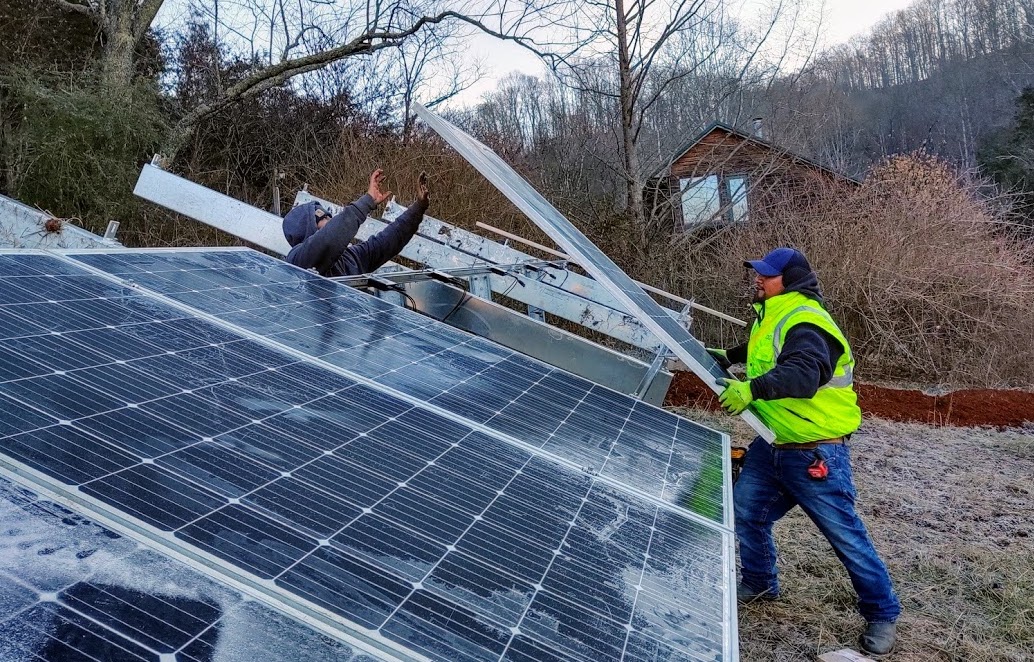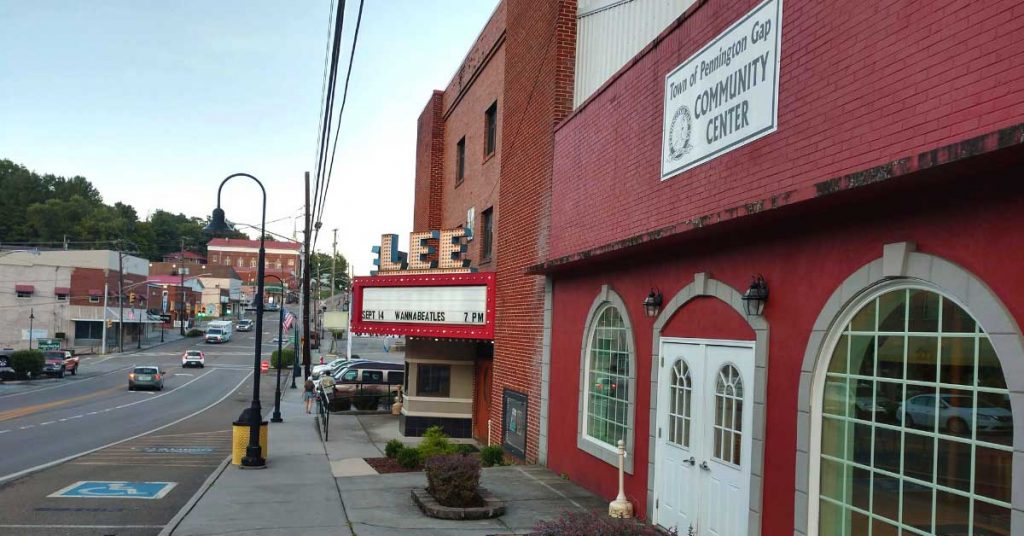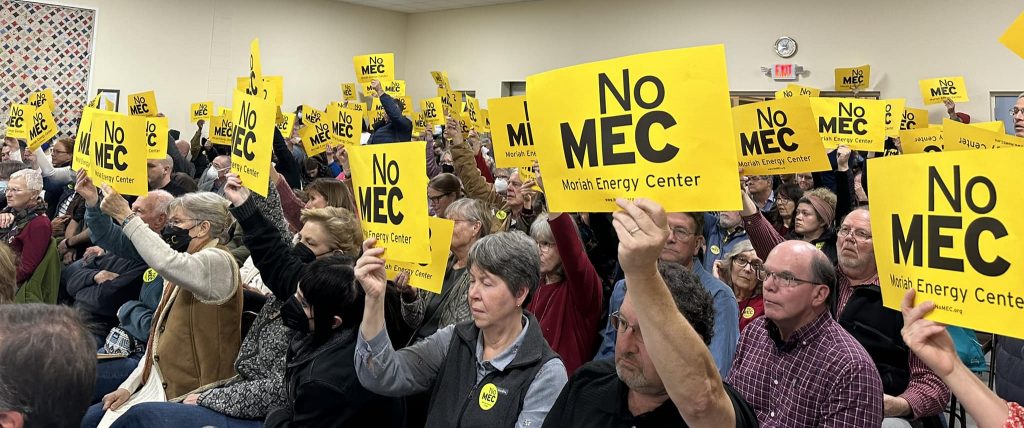Southwest Virginians Share Solar Experiences
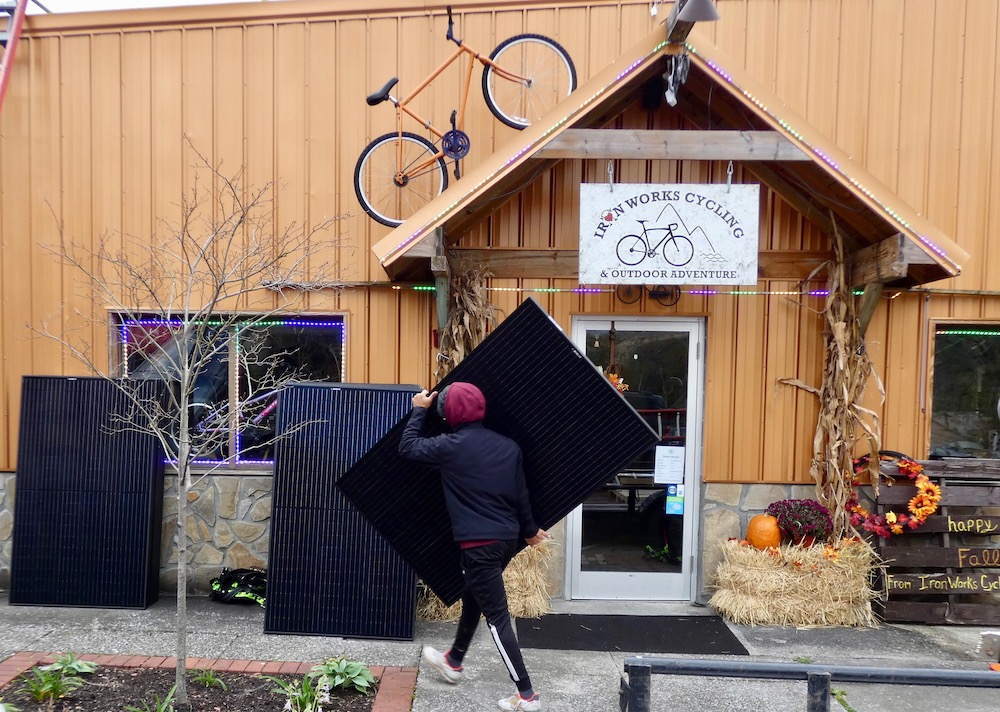
A worker with Sigora Solar carries a panel to be installed on the roof of Iron Works Cycling in Big Stone Gap, Va. Photo provided
Lorenzo Rodriguez, Iron Works Cycling
Before Iron Works Cycling co-owner Lorenzo Rodriguez installed a 16-kilowatt solar array on his Big Stone Gap, Virginia, bicycle shop in late 2020, his power bills ranged anywhere from $90 to $300 depending on the season. Now, the shop does not need to pay for electricity, though Old Dominion Power charges $30 monthly to stay connected to the grid.
“We’re producing an excess of energy right now,” said Rodriguez in June. “Those excess kilowatt-hours are accumulated and then, as we go into the winter and we don’t have as much sunlight, then they’ll take from those bank hours and it should even out to where we never have to pay.”
“It’s a significant savings when you don’t have to worry about that payment, especially in the bike shop where our business is seasonal and our payments were higher when we were doing less business,” he adds.
Thanks to savings and a $25,000 grant from the Solar Moonshot program, Rodriguez was able to pay off Iron Works’ solar system in its entirety. The Solar Moonshot initiative is managed by Hammond Climate Solutions and provides grants to organizations across the country to go solar. Appalachian Voices, the nonprofit that produces The Appalachian Voice, assisted in the application process for this grant. Sigora Solar installed the array.
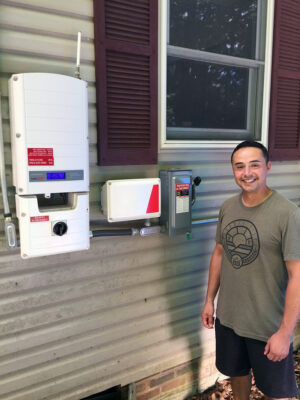
Net metering allows Lorenzo Rodriguez to send excess power from his home solar panels to the grid and to draw power from the grid when needed. Photo by Austin Counts
“What I’m saving throughout the year pretty much makes up for it,” says Rodriguez. “I’m basically locking in my own power rate by doing that.”
Peggy Mathews
Installing a residential solar array in late 2019 was a dream come true for Dungannon, Virginia, resident Peggy Mathews.
“I’ve been wanting solar since the late ‘70s,” says Mathews, who is a board member of Appalachian Voices, the nonprofit organization that produces The Appalachian Voice. “I’ve been keeping my eye on solar legislation, solar tax credits, all of that for years.”Mathews and her husband had their system installed in-ground by Sigora Solar. Before solar, Mathews’ previous June power bills were around $100. In 2021, her June power bill was $14.
While Mathews and her husband paid for the system outright, they were able to take advantage of a 30% federal tax credit before it dropped to 26% in 2020. Additionally, they saved around $1,000 in machinery rental costs by getting their solar array installed at the same time as some neighbors.
“All of us are very happy we went solar,” says Mathews. “It’s the right thing to do.”
Mathews states that she and her husband were lucky they didn’t have to take out a loan, and that a program like on-bill financing would go a long way toward making solar more accessible to others in the area. On-bill financing is a system used by some utilities and electric co-ops where the utility or a third party pays for the upfront cost of solar. The cost is then repaid by the resident through a charge on their monthly power bill, which ends up being cheaper thanks to the solar savings.“[Solar] has to be affordable,” says Mathews. “If it’s affordable, people will go for it.”
People Inc.
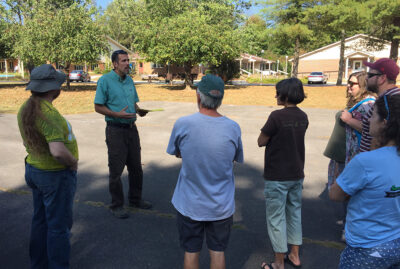
Mark Moormans of People Incorporated tells solar tour attendees about his organization’s work to bring the benefits of solar to low-income residents in Southwest Virginia. Photo by Austin Counts
After receiving a federal grant in 2012, People Inc. built geothermal systems for clients in Damascus, installed solar hot water heaters at apartments in Abingdon, and put solar panels on top of apartments in Dante. The Appalachian Voice reported that the installation in Dante cut residents’ utility bills by 50%.
“We are very interested in pursuing renewable energy in our developments when we can,” says People Inc. Chief Development Officer Bryan Phipps. “Honestly, we’ve had a lot less luck with that than we had hoped when starting out.”
In Appalachian Power territory, People Inc. has been unable to install solar on some properties. Phipps states that the utility has been at the table and has been supportive, but Appalachian Power still won’t allow People Inc. to aggregate the individually metered units so they can manage them with net metering — a system that credits residents on their power bill for the excess energy their solar array produces.
“The ability to do [meter aggregation and net metering] along with mandating robust and accessible community solar programs definitely remains at the forefront of the Solar Workgroup’s priorities for the next legislative session,” wrote People Inc. spokesperson Rachel Fogg in an email.
Related Articles
Latest News

Leave a comment
Your email address will not be published. Required fields are marked *


